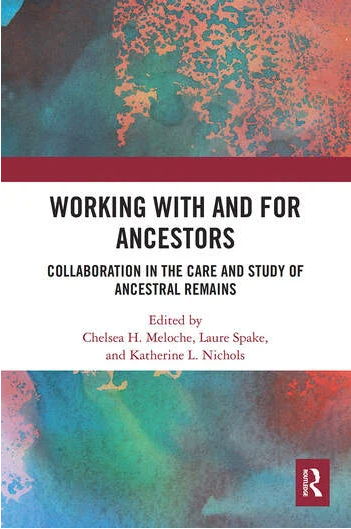
祖先の遺骨とともに働く「返還の仕事」
Working with and for Ancestors,
Collaboration in the Care and Study of Ancestral Remains
☆ 先祖とともに、先祖のために」では、先住民の祖先の遺骨の研究と保護をめぐる共同パートナーシップについて検証している。 和解の観点から、世界中の博物館や研究機関は、コレクションの管理や研究方針の策定にあたり、先住民の子孫たちから積極的に意見や方向性を求めるように なった。しかし、真の協力関係を築くことは難しく、時間もかかり、時に気まずい状況も生じる。本書では、先祖の遺骨をめぐるプロジェクトの例を挙げ、協力 関係をうまく築いている例を紹介することで、科学者や子孫のコミュニティが、先祖の遺骨の研究や管理について、オープンで敬意ある話し合いを行うよう促し ている。主なテーマには、先祖のケアに対する新たなアプローチ、文化的に配慮した博物館政策の策定、相互に有益な研究パートナーシップの構築、知的財産、 デジタルデータ、破壊的分析の代替手段といった新たな問題などが含まれる。また、著名な学者による重要な議論では、返還プロセスにおける残された課題を特 定し、前進を続けるための手段を提示している。 本書は、研究者と子孫のコミュニティとの相互利益関係を築くことを目的とした共同研究や管理戦略に関心のある、幅広い分野の読者にとって興味深い内容と なっている。これには、考古学、人類学、博物館学、先住民コミュニティの学生や研究者が含まれる。
| Working
with and for Ancestors examines collaborative partnerships that have
developed around the study and care of Indigenous ancestral human
remains. In the interest of reconciliation, museums and research institutions around the world have begun to actively seek input and direction from Indigenous descendants in establishing collections care and research policies. However, true collaboration is difficult, time-consuming, and sometimes awkward. By presenting examples of projects involving ancestral remains that are successfully engaged in collaboration, the book provides encouragement for scientists and descendant communities alike to have open and respectful discussions around the research and care of ancestral human remains. Key themes for discussion include new approaches to the care for ancestors; the development of culturally sensitive museum policies; the emergence of mutually beneficial research partnerships; and emerging issues such as those of intellectual property, digital data, and alternatives to destructive analyses. Critical discussions by leading scholars also identify the remaining challenges in the repatriation process and offer a means to continue moving forward. This volume will appeal to a broad, interdisciplinary audience interested in collaborative research and management strategies that are aimed at developing mutually beneficial relationships between researchers and descendant communities. This includes students and researchers in archaeology, anthropology, museums studies, and Indigenous communities. |
先祖とともに、先祖のために」では、先住民の祖先の遺骨の研究と保護をめぐる共同パートナーシップについて検証している。 和解の観点から、世界中の博物館や研究機関は、コレクションの管理や研究方針の策定にあたり、先住民の子孫たちから積極的に意見や方向性を求めるように なった。しかし、真の協力関係を築くことは難しく、時間もかかり、時に気まずい状況も生じる。本書では、先祖の遺骨をめぐるプロジェクトの例を挙げ、協力 関係をうまく築いている例を紹介することで、科学者や子孫のコミュニティが、先祖の遺骨の研究や管理について、オープンで敬意ある話し合いを行うよう促し ている。主なテーマには、先祖のケアに対する新たなアプローチ、文化的に配慮した博物館政策の策定、相互に有益な研究パートナーシップの構築、知的財産、 デジタルデータ、破壊的分析の代替手段といった新たな問題などが含まれる。また、著名な学者による重要な議論では、返還プロセスにおける残された課題を特 定し、前進を続けるための手段を提示している。 本書は、研究者と子孫のコミュニティとの相互利益関係を築くことを目的とした共同研究や管理戦略に関心のある、幅広い分野の読者にとって興味深い内容となっている。これには、考古学、人類学、博物館学、先住民コミュニティの学生や研究者が含まれる。 |
| Table of Contents Part 1 Building Relationships: Proceed with Respect and Patience 1 Bearing Witness: What Can Archaeology Contribute in an Indian Residential School Context? Eric Simons, Andrew Martindale, and Alison Wylie 2 Pathway to Decolonizing Collections of Ainu Ancestral Remains: Recent Developments in Repatriation Within Japan Mayumi Okada 3 The Brandon Indian Residential School Cemetery Project: Working Towards Reconciliation Using Forensic Anthropology and Archaeology Katherine L. Nichols 4 Washington’s Non-Forensic Human Skeletal Remains Law and the State Physical Anthropologist: A Collaborative Process and Model for Other States Guy L. Tasa, Juliette Vogel, and Lance K. Wollwage 5 Bii-Azhe Ḡiiwé Iná Daanig (Let’s Bring Them Home): Lessons in Humility, Relationships, and Changing Perspectives Kayleigh Speirs and Tasha Hodgson Part 2 Caring for the Ancestors: Developments in Museum Collaborations 6 Why We Repatriate: On the Long Arc Toward Justice at the Denver Museum of Nature & Science Chip Colwell and Stephen E. Nash 7 the Importance of Kaitiakitanga (Guardianship and Care) and Rangahau (Research) for the Karanga Aotearoa Repatriation Programme Amber Aranui and Te Arikirangi Mamaku 8 Toward a Twenty-First-Century Model for the Collaborative Care and Curation of Human Remains Emily Hayflick and Helen a. Robbins 9 The Southern African Human Remains Management Project: Making (P)Reparations in Year One Wendy Black and Keely Mccavitt 10 Caring for the Ancestors at the Royal BC Museum Lucy Bell, Sdaahl K’awaas and Genevieve Hill Part 3 Learning From the Ancestors: Collaborative Research Projects 11 The Journey Home: Sto:Lō Values and Collaboration in Repatriation David M. Schaepe and Susan Rowley 12 the Joy of the Souls: the Return of the Huron-Wendat Ancestors Crystal L. Forrest, Ronald F. Williamson, Susan Pfeiffer, and Louis Lesage 13 Building Relationships to Shift Accountability: Doing Paleogenomic Research with Indigenous Nations and Ancestors Alyssa C. Bader, Aimee E. Carbaugh, Jessica Bardill, Ripan S. Malhi, Barbara Petzelt, and Joycelynn Mitchell 14 Learning from Ancestors Caring for Ancestors: The Antiquity of Reburial On Bkejwanong Dean Jacobs, David White, Neal Ferris, and Michael W. Spence 15 New Insights from Old Dog Bones: Dogs as Proxies for Understanding Ancient Human Diets Bonnie Glencross, Louis Lesage, Tracy Prowse, Taylor Smith, and Gary Warrick Part 4 Developing Conversations: Doing Better Together 16 The Digital Lives of Ancestors: Ethical and Intellectual Property Considerations Surrounding the 3-D Recording of Human Remains Laure Spake, George Nicholas, and Hugo F.V. Cardoso 17 What Next? Changing Ethical Protocols for Human Remains in Museums Lia Tarle, George Nicholas, and Hugo F.V. Cardoso 18 Provenancing Australian Aboriginal Ancestors: The Importance of Incorporating Traditional Knowledge Anna Weisse 19 Ancient Human DNA: Surveying the Evolving Ethical, Social, and Political Landscape Alexa R. Walker Part 5 Moving Forward: There’s Still Work To Do 20 Identity in Applied Repatriation Research and Practice Cressida Fforde, C. T Imothy Mckeown, Honor Keeler, Lyndon Ormond-Parker, Paul Tapsell, Paul Turnbull, Steve Hemming, Daryle Rigney, Michael Pickering, Amber Aranui, Wes Morris, and Gareth Knapman 21 Decolonizing Bioarchaeology? Moving Beyond Collaborative Practice Kisha Supernant |
目次 第1部 関係構築:敬意と忍耐を持って 1 証言:考古学はインドの寄宿学校の文脈において何をもたらすことができるか? エリック・サイモンズ、アンドリュー・マーティンデイル、アリソン・ワイリー 2 アイヌの祖先の遺骨収集の脱植民地化への道:日本における返還の最近の動向 岡田真弓 3 ブランドン・インディアン寄宿学校墓地プロジェクト:法医学人類学と考古学を用いた和解への取り組み キャサリン・L・ニコルズ 4 ワシントン州の非法医学的人骨遺骨法と州立自然人類学者:他州のための共同作業プロセスとモデル ガイ・L・タサ、ジュリエット・フォーゲル、ランス・K・ウォルウェッジ 5 Bii-Azhe Ḡiiwé Iná Daanig (Let's Bring Them Home): Lessons in Humility, Relationships, and Changing Perspectives ケイリー・スピアーズ、ターシャ・ホッジソン 第2部 先祖の遺骨を大切に:博物館との協力関係の発展 6 返還の理由:デンバー自然科学博物館における正義への長い道のり チップ・コルウェル、スティーブン・E・ナッシュ 7 カラング族の「カイタイアキタンガ(保護とケア)」と「ランガハウ(研究)」の重要性:アオテアロア返還プログラム アンバー・アランギとテ・アリキランギ・ママク 8 共同管理と保存における21世紀のモデルを目指して エミリー・ヘイフリックとヘレン・A・ロビンス 9 南アフリカの人骨管理プロジェクト:初年度の補償(P) ウェンディ・ブラックとキーリー・マカビット 10 ロイヤルBC博物館における先祖のケア ルーシー・ベル、スダール・カワース、ジュヌヴィエーヴ・ヒル 第3部 先祖から学ぶ:共同研究プロジェクト 11 故郷への旅:ストロー族の価値観と返還における協力 デビッド・M・シェーペ、スーザン・ロウリー 12 魂の喜び:ヒューロン・ウェンダット族の祖先の帰還 クリスタル・L・フォレスト、ロナルド・F・ウィリアムソン、スーザン・ファイファー、ルイス・レサージュ 13 責任を転換する関係構築:先住民と祖先とともに古ゲノム研究を行う アリッサ・C・バダー、エイミー・E・カーボー、ジェシカ・バディル、リパン・S・マルヒ、バーバラ・ペッツァルト、ジョイスリン・ミッチェル 14 先祖から学ぶ、先祖を大切にする:Bkejwanongにおける再埋葬の古代 ディーン・ジェイコブス、デイビッド・ホワイト、ニール・フェリス、マイケル・W・スペンス 15 古い犬の骨から得られた新たな洞察:古代人の食生活を理解するための代理としての犬 ボニー・グレンクロス、ルイス・レサージュ、トレイシー・プロウズ、テイラー・スミス、ゲイリー・ウォリック 第4部 会話の発展:共に向上する 16 先祖のデジタルライフ:遺骨の3D記録をめぐる倫理的・知的財産権上の考察 ローレ・スペーク、ジョージ・ニコラス、ヒューゴ・F・V・カルドーゾ 17 次に何を? 博物館における遺骨の倫理的プロトコルの変更 リア・タル、ジョージ・ニコラス、ヒューゴ・F・V・カルドーゾ 18 オーストラリア先住民の祖先の由来を明らかにする:伝統的知識の取り入れの重要性 アンナ・ワイス 19 古代人のDNA:進化する倫理的、社会的、政治的状況の調査 アレクサ・R・ウォーカー 第5部 前進:まだやるべきことはある 20 応用先住民返還研究と実践におけるアイデンティティ Cressida Fforde、C. T Imothy Mckeown、Honor Keeler、Lyndon Ormond-Parker、Paul Tapsell、Paul Turnbull、Steve Hemming、Daryle Rigney、Michael Pickering、Amber Aranui、Wes Morris、Gareth Knapman 21 脱植民地化する生物考古学? 共同実践の先へ Kisha Supernant |
| https://x.gd/IPz7n |
|
リ ンク
文 献
そ の他の情報
Copyleft, CC, Mitzub'ixi Quq Chi'j, 1996-2099
☆
 ☆
☆